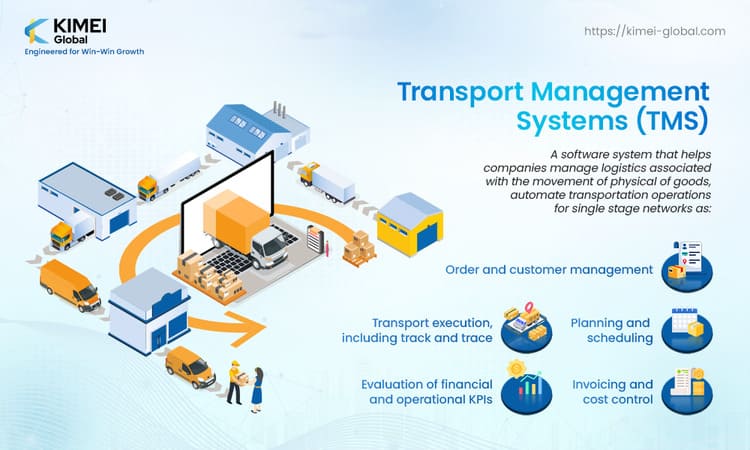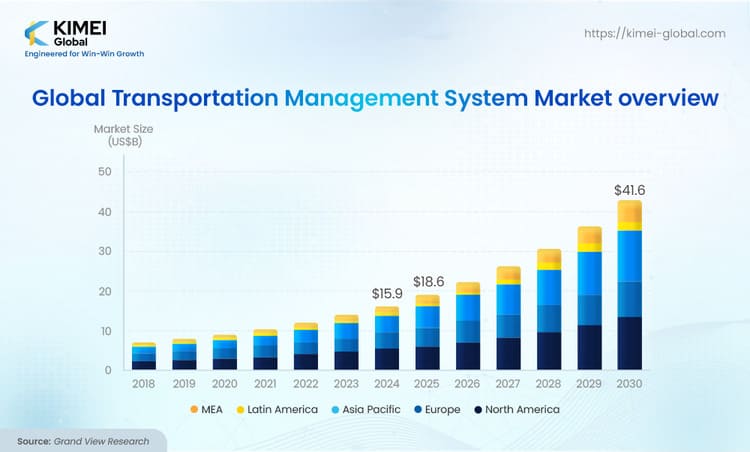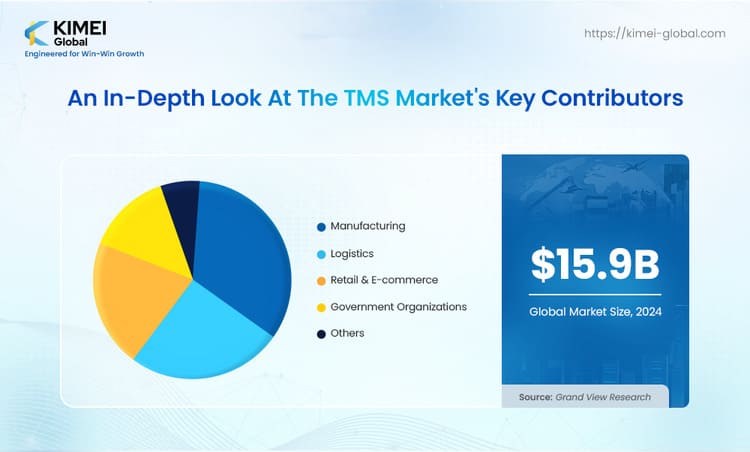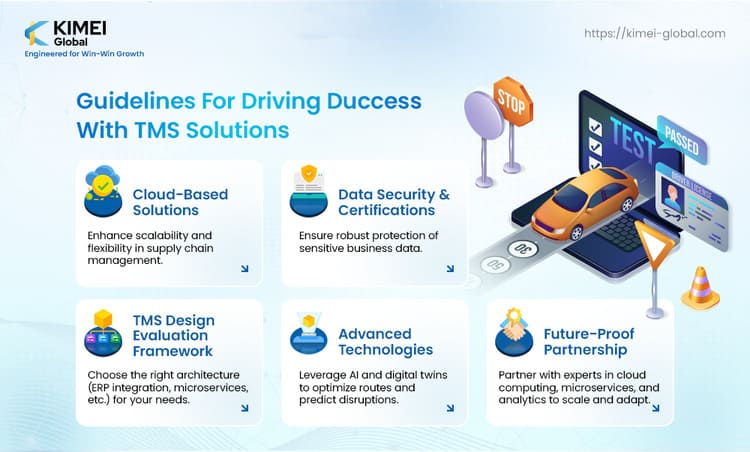The Future of Logistics: Key Transportation Management System (TMS) Market Trends for 2025
The Transportation Management System (TMS) is a sophisticated, cloud-based platform designed to fully optimize and manage the entire process of moving goods across the supply chain. It focuses on the planning, execution, and monitoring of transport operations, enabling companies to enhance performance and minimize logistics expenses.
In this blog, we'll explore how IT outsourcing is driving innovation in the logistics world through sophisticated TMS platforms.

1. Global Market Landscape for Transportation Management Systems
According to Grand View Research, the global Transportation Management System (TMS) market was valued at USD 15.88 billion in 2024 and is projected to reach USD 41.57 billion by 2030, expanding at a CAGR of 17.5% from 2025 to 2030. As the shipping environment becomes progressively complex, the necessity for robust TMS technology is more pressing than ever. Industry observers emphasize that the expansion of TMS adoption is primarily fueled by users who consistently seek elevated features and capabilities from their software partners.

2. Key Features of a Transportation Management System (TMS)
With the advancement of Industry 4.0, TMS (Transportation Management System) is becoming increasingly popular and widely applied across various sectors, from economics to science and technology, thus contributing to the development of the digital economy.
- Documentation and Record Management: The TMS provides a system for storing and managing all relevant documents, ensuring easy access and information tracking.
- Personnel and Fleet Management: The system allows for tracking driver information, fuel costs, maintenance schedules, and overall goods distribution activities.
- Operational System Automation: TMS supports the scientific and efficient planning and arrangement of routes, saving time and effort during the operational process.
- Shipment Track and Trace: With this function, businesses can accurately monitor the real-time location and status of goods via a GPS system combined with IoT (Internet of Things) technology.
3. Emerging Innovations in TMS to Address Market Needs
TMS is widely applied across many types of businesses engaged in shipping and delivery activities:
- Manufacturers: Managing the transport of raw materials and finished goods.
- Distributors: Optimizing the process of distributing goods to dealers and customers.
- E-commerce Companies: Managing the last-mile delivery of orders directly to consumers.
- Retail Businesses: Tracking and managing the transportation of goods from warehouses to stores, ensuring stable supply.
- Transportation Service Providers and Logistics Hubs: Utilizing TMS as a tool to optimize processes and enhance operational efficiency.
According to Brock Johns, a senior analyst at Gartner, Inc., predicts strong growth across the TMS segment, particularly targeting small and medium-sized shippers, as the hurdles to implementing TMS have notably decreased in recent years.
Facing market demand and intense rivalry, retailers are increasingly adopting advanced TMS solutions (including hybrid-cloud management) to optimize workflows and cut IT costs. Ultimately, TMS empowers these businesses to scale distribution efficiently and sustain a competitive advantage through agile, data-driven insights.

4. Five Critical Success Factors for a TMS Implementation
To ensure the successful deployment and operation of a Transportation Management System (TMS), businesses must focus on five core factors, as outlined by KIMEI Global:
-
Cloud-Based Solutions: Adopting a cloud-based approach is foundational, enhancing the scalability and flexibility of supply chain management, making the system agile and accessible.
-
Data Security & Certifications: This factor is non-negotiable. It requires ensuring robust protection of sensitive business data and obtaining appropriate certifications, thereby mitigating legal and cybersecurity risks.
-
TMS Design Evaluation Framework: Businesses must diligently choose the right architecture (e.g., ERP Integration, microservices) that precisely matches their operational needs and technological ecosystem.
-
Advanced Technologies: Success is driven by leveraging innovations like AI and digital twins to optimize routes, simulate scenarios, and predict disruptions, leading to better decision-making and improved logistics quality.
-
Future-Proof Partnership: Establishing a sustainable partnership with experts proficient in cloud computing, microservices, and analytics is key to guaranteeing the TMS can scale and adapt to future market changes and business growth.

At KIMEI Global, we provide tailored TMS software solutions to help businesses streamline the business operations. =Let start your project with us for the complexities of transportation oversight and make smarter logistics choices!
Connect with us at:
Email: [email protected] | Phone: (+84) 28 3636 9191
Đăng ký nhận bản tin
Cập nhật tin tức mới nhất của chúng tôi.
Đăng ký nhận bản tin
Cập nhật tin tức mới nhất của chúng tôi.